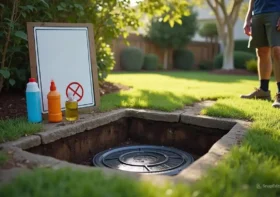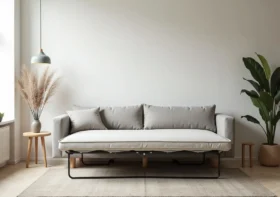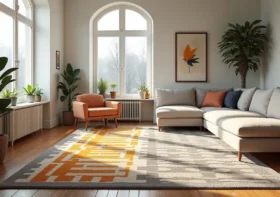The Complete Guide to Clear Polycarbonate Sheets

Polycarbonate (PC) sheets or panels are a type of thermoplastic polymer admired for their natural transparency, strength, impact resistance and lightness. Due to their unique properties and numerous benefits, clear PC sheets are used as a glass replacement in various settings, including industrial, commercial, and residential applications.
Whether you’re a professional or a hobbyist, this guide covers everything you need to know about the material: its key traits, advantages, limitations, and whether it suits your requirements.
Contents
Advantages
Before you shop for clear polycarbonate panels, understanding what they offer is key. These sheets have several advantages that make them a popular choice across different industries.
High Impact Resistance
Clear polycarbonate sheet panels are known for their outstanding impact resistance. Around 200 times stronger than glass, they can handle high-impact force without cracking or breaking. This makes them ideal for environments where safety and durability are critical.
Despite their strength, they are much lighter than glass, offering a superior strength-to-weight ratio. As a result, they’re often used in demanding applications such as bulletproof windows, police shields, automotive headlights, and safety goggles. Their ability to stay intact under stress makes them a reliable choice for both protective and industrial uses, especially where traditional glass would fail or be too fragile.
Transparency
Clear polycarbonate panels offer excellent optical clarity, with up to 90% light transmission, making them a strong alternative to glass in applications where visibility is non-negotiable. Their transparency supports natural lighting while adding durability and protection.
Unlike traditional glass, PC sheets allow diffused light to pass through, spreading it evenly across a space rather than concentrating it in specific areas. This creates a more balanced and comfortable indoor environment. Because of this, they’re commonly used in offices, factories, homes, and greenhouses- places where consistent, natural light is needed. Their ability to maintain clarity while reducing glare and UV exposure makes them a practical and energy-efficient choice.
Lightweight Nature
Although polycarbonate is extremely strong, it remains relatively lightweight, making it a practical choice across various industries. In sectors like aerospace and automotive, its low weight plays a crucial role in reducing overall load without compromising durability.
Clear PC sheets weigh roughly half as much as glass, yet still offer impressive strength and resilience. This balance of toughness and lightness makes handling and installation easier, especially in large-scale projects.
Heat and Fire Resistance
Another advantage is their resistance to heat and fire. Transparent PC sheets can handle high temperatures without melting or warping, thanks to their high glass transition point. This makes them suitable for applications like microwave-safe containers and LED light covers.
They are also considered flame retardant in most cases, which adds to their safety in construction and manufacturing settings. With UL 94 V-0 or V-2 ratings, they either stop burning when the flame is removed or burn slowly. This heat and fire resistance makes polycarbonate a safe and practical choice for high-temperature environments.
UV Resistance
PC sheets offer strong resistance to ultraviolet (UV) radiation, making them a reliable choice for outdoor use. They’re often used in applications like greenhouse panels or protective covers for outdoor equipment.
Many clear PC sheets include a UV-protective layer on one or both sides, which helps prevent yellowing, cracking, or weakening caused by long-term sun exposure. This added protection helps maintain the material’s clarity and strength over time, even in harsh conditions. Their durability under sunlight makes them ideal for settings where long-term outdoor performance is important.
Flexibility and Workability
Another benefit of clear PC sheets is their flexibility and workability. Unlike glass, which can only be shaped into flat forms, PC can be moulded into curved or rounded structures such as domes, arched roofs, and circular designs. This makes it ideal for architectural projects that need more complex shapes.
It’s also easy to cut, drill, and shape using standard tools, allowing for quick customisation across different applications. Even when thermoformed, this material maintains its optical clarity, making it both practical and visually appealing for creative and structural designs.
Insulation
Clear PC sheets provide strong thermal, acoustic and electrical insulation. They offer better heat retention than glass, which helps conserve energy and lower heating costs. With a thermal resistance range from -40°C to 120°C, they remain durable in a wide variety of conditions.
These sheets are also effective as sound barriers. Although transparent, they help block noise, making them an ideal option for office partitions where both visibility and privacy matter. Polycarbonate is also an excellent electrical insulator, often used in electronic components to reduce the risk of short circuits and electrical hazards.
Disadvantages
Prone to Scratching
A possible disadvantage of transparent polycarbonate sheets is their tendency to scratch. While they are strong and impact-resistant, the surface can be marked easily by contact with rough or sharp objects. For instance, falling branches or debris can leave visible scratches on outdoor installations such as patio canopies.
This can affect the appearance over time, especially in clear applications where visual clarity matters. However, you can often improve minor surface damage with polishing, which restores some of the clarity.
Chemical Sensitivity
Another disadvantage of transparent PC sheets is their sensitivity to certain chemicals, solvents and cleaning agents. That’s why it’s key to use the right cleaning products and avoid harsh chemicals. If the sheets are used in areas where strong chemicals are common, they may not last as long. Proper care and gentle cleaning minimise the risk of damage, but it’s still something to consider.
What Is the Use of Polycarbonate Sheets?
Here are some common applications of PC sheets:
- Roofing and skylights – Used for letting in natural light while offering protection from the elements.
- Greenhouses – Provide a strong, light-transmitting cover that helps control temperature and UV exposure.
- Safety glazing – Often used as a lightweight, shatter-resistant alternative to glass in windows and doors.
- Protective barriers – Ideal for machine guards, face shields, or sneeze guards in public spaces.
- Soundproof partitions – Used in offices and commercial spaces for noise reduction while maintaining visibility.
- Automotive and aerospace parts – Selected for their strength and reduced weight.
- Electronics and lighting – Used for housings, LED light covers, and electrical insulation.



